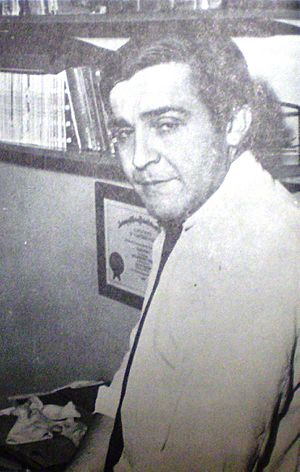Francisco Urondo facts for kids
Francisco "Paco" Urondo (born January 10, 1930, in Santa Fe – died June 17, 1976, in Mendoza) was an Argentine writer. He was known for his poetry, short stories, and plays. He was also a member of the Montoneros, a group that worked for social and political change in Argentina.
Paco Urondo wrote many books of poetry, short stories, and plays. He also wrote a novel. One of his most famous books is La patria fusilada. This book shares interviews with people who survived the Trelew massacre. He also wrote an important essay about Argentine poetry. Urondo helped write movie scripts, like Pajarito Gómez. He also adapted classic books for television, such as Madame Bovary and Le Rouge et le Noir.
In 1968, he became the General Culture Director for the Santa Fe Province. Later, in 1973, he led the Literature Department at the University of Buenos Aires. As a journalist, he wrote for many newspapers and magazines. These included Primera Plana and Noticias. On June 17, 1976, he died in an ambush.
Contents
Paco's Journey: Writing and Activism
When Paco Urondo was 18, he left home. He tried studying chemistry, then law, and then philosophy. But none of these felt right for him. He stopped his studies and moved to Buenos Aires. There, he had a busy social life. His friends knew him as a lively and smart person. For a short time, he even worked with puppets.
His writing career began in the 1950s with his first poetry books. At the same time, he became more involved in political groups. He first joined the FAR. Later, he became part of the Montoneros. For Urondo, his writing and his activism were deeply connected. His friend, the poet Juan Gelman, remembered Urondo saying that he "took up arms because he was looking for the right word." This meant he saw his activism as part of his search for truth through writing.
In the 1960s and 1970s, Urondo, along with poets like Juan Gelman and Mario Benedetti, developed a direct style of writing. They wrote openly about difficult social and political issues. They wanted to share truths and resist silence. Even so, their main goal was always to create beautiful art.
Urondo was put in prison in 1973 but was later set free. That same year, he published La Patria Fusilada. This book tells the stories of three people who survived the Trelew massacre.
Because of his activism, Urondo had to live a secret life. He tried hard to disguise himself in public. He even used a fake name, Ortiz. He knew he was in danger. He carried a special pill so that if he was caught, he would not be forced to betray his friends.
In 1976, Urondo had an important role in the Montoneros. But he was moved to a different position for internal reasons. He had to transfer to a new city. He asked not to be sent to Santa Fe or Mendoza, because he was well-known there. However, he was still sent to lead the group in Mendoza. With no other choice, Urondo went to Mendoza in May 1976. His partner, Alicia Raboy, and their one-year-old child, Angela, went with him.
Justice for Urondo
In 2011, the people responsible for Urondo's death were found guilty. Juan Agustín Oyarzábal Navarro, Eduardo Smahá Borzuk, Alberto Rodríguez Vázquez, and Celustiano Lucero received the longest possible sentences. Dardo Migno was sentenced to 12 years in prison.
Paco Urondo's Works
- Historia Antigua, poetry, 1956.
- Breves, poetry, 1959.
- Lugares, poetry, 1961.
- Nombres, poetry, 1963.
- Todo eso, short-stories, 1966.
- Veraneando y sainete con variaciones, play, 1966.
- Al tacto, short-stories, 1967.
- Del otro lado, poetry, 1967.
- Adolecer, poetry, 1968.
- Veinte años de poesía argentina, essay, 1968.
- Larga distancia, poetry, Madrid, 1971.
- Los pasos previos, novel, 1972.
- La patria fusilada, interviews, 1973.
- Cuentos de batalla, poetry, 1998.
- Poemas, poetry, Visor.
- Obra poética, poetry, Hidalgo, 2006.
Books About Francisco Urondo
- The Unfinished Song of Francisco Urondo: When Poetry is Not Enough (Hernán Fontanet, Lanham, MD: University Press of America, 2014) ISBN: 978-0-7618-6457-8.
- Francisco Urondo y su poesía: un arma cargada de futuro (Hernán Fontanet, Newark, DE: Juan de la Cuesta - Hispanic Monographs, 2012) ISBN: 978-1-58871-213-4.
See also
 In Spanish: Paco Urondo para niños
In Spanish: Paco Urondo para niños
 | Isaac Myers |
 | D. Hamilton Jackson |
 | A. Philip Randolph |


